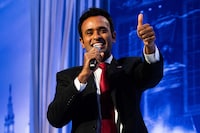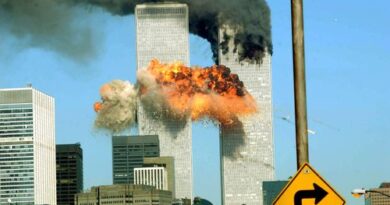The inevitable overlap of Jan. 6 and 9/11 trutherism

This article has been updated.
The entire point of 9/11 trutherism — that is, in some way embracing skepticism about the terrorist attacks on Sept. 11, 2001 — is to position the believer as unusually savvy, too clever to accept the insistences of the experts or the federal government.
The attacks occurred as the internet was still emerging into the mainstream, so conspiracy theories about what happened in New York and D.C. propagated quickly through a conduit largely unprepared to address them. Sept. 11 was a formative moment for the internet-driven, do-your-own-research impulse, an impulse that has now manifested in a variety of other anti-establishment arguments, from covid-19 to QAnon to the riot at the Capitol on Jan. 6, 2021.
It’s a shared heritage that unexpectedly tripped up a long-shot-but-surging candidate for the Republican presidential nomination in 2024. Instead of focusing on preparation for the first debate of the cycle, entrepreneur Vivek Ramaswamy is instead carving out time this week to clean up a 9/11 mess of his own making.
Ramaswamy’s entire shtick is a sort of intellectually polished version of what elevated Donald Trump in 2015, embracing popular conspiracy theories in the manner of Trump but attempting to rationalize them through rhetorical cleverness. In speaking to the Atlantic’s John Hendrickson, though, Ramaswamy got a little too cute, suggesting that perhaps 9/11 was somehow a function of government infiltration.
At a dinner, Ramaswamy told the audience that the public could handle the “truth” about the Capitol riot. Hendrickson later asked him what that “truth” was, obviously understanding that Ramaswamy was generally winking at conspiracy theories like those elevated by former Fox News host Tucker Carlson. Ramaswamy shrugged, offering a just-asking-questions response about the unsupported idea that government agents were involved.
“Then, suddenly,” Hendrickson wrote, “he was talking about 9/11.”
“I think it is legitimate to say how many police, how many federal agents, were on the planes that hit the Twin Towers. Maybe the answer is zero. It probably is zero for all I know, right? I have no reason to think it was anything other than zero,” Ramaswamy said. “But if we’re doing a comprehensive assessment of what happened on 9/11, we have a 9/11 Commission, absolutely that should be an answer the public knows the answer to.”
Hendrickson pressed him on this, asking the candidate if he was actually uncertain about culpability for the attacks.
“I mean, I would take the truth about 9/11,” Ramaswamy replied. “I am not questioning what we — this is not something I’m staking anything out on. But I want the truth about 9/11.” He was going to say he wasn’t just asking questions, but, of course, he was.
That story published on Monday. That evening, CNN’s Kaitlan Collins hosted the candidate for an interview.
It was almost immediately confrontational. Ramaswamy’s approach to traditional media is often to go on offense, to treat his interlocutors as accusers acting in bad faith rather than as parties interested in testing the validity of his assertions. At one point, he dismissed Collins’s questions about a past comment by insisting that she “might be able to do this trick better with other candidates who don’t really know how to respond to the game.”
Then they got to 9/11.
The core of Ramaswamy’s response to the controversy was to insist that he hadn’t said what Hendrickson claimed.
“I’m telling you the quote is wrong, actually,” Ramaswamy told Collins. He added: “I asked that reporter to send the recording, because it was on the record. He refused to do it. But we had a free-flowing conversation.”
The Atlantic denies this claim.
“The quotes in the piece are accurate,” Anna Bross, a spokesperson for the magazine, told The Washington Post. “John’s interviews were recorded and fact-checked.”
There’s no reason to grant Ramaswamy the benefit of the doubt here. It is more believable that Ramaswamy, riffing during his conversation with Hendrickson, took his well-practiced rhetoric about the dubiousness of the government over the line than that Hendrickson is interested in torpedoing his career over a quote dropped at the tail end of a lengthy profile. Ramaswamy has been criticized for times at which his campaign-trail rhetoric has conflicted with past public statements, including about Jan. 6. It’s not hard to believe that, to Collins, he was similarly offering the best available argument for the moment.
Update: The Atlantic has now published the audio cited in Hendrickson’s article.
Ramaswamy was also ready with a what-I-really-meant-was response.
“The truth is there are lies the government has told about 9/11. But it’s not the ones that somebody put in my mouth. It’s the one that I articulated, which is that Saudi Arabia, absolutely, their intelligence was involved in 9/11,” he said. “And that’s a difficult thing you’re not supposed to say. The facts back that up.”
This was the comparison to the Capitol riot, he continued, which was the “same story all over again.”
“There were federal agents, in the field,” he said. “I think they’ve lied about how many there were. And we the people deserve the truth.”
The idea that there were a number of government actors in the crowd on that day has not been established. But remember that this assertion — hard to debunk in part because the government has a policy of not answering methodology questions — is simply the current resting place of the broader idea that the riot wasn’t a function of angry Trump supporters. Ramaswamy isn’t really talking about agents in the crowd; he’s tapping into the impulse of primary voters to see the whole thing as a setup. This is just what that wink looks like in the moment.
Ramaswamy did argue that he believed the government had lied about the involvement of Saudi Arabian nationals in the 2001 attacks. This is a complicated question, rooted in a redacted portion of the 9/11 Commission’s final report on the attacks and on a subsequent FBI report that detailed more obvious links.
There are legitimate questions about whether the commission was too quick to play down possible involvement or whether that section should have been redacted. But there is a difference between a lack of information and a willful lie — and a much wider gap between “the government covered up possible Saudi links” and “there were federal agents on the 9/11 planes.” As Collins noted, 9/11 deniers are happy to have any skepticism elevated, since that’s the entire point.
Collins also played a clip from a recent interview in which Ramaswamy was asked whether 9/11 was “an inside job or exactly how the government tells us.”
“I don’t believe the government has told us the truth,” he replied. “Again, I’m driven by evidence and data. What I’ve seen, in the last several years, is we have to be skeptical of what the government does tell us.”
That’s the essence of his approach to this issue and his campaign more broadly. Take one commonly accepted failure on the part of the government or experts and extrapolate outward to rejecting them entirely. The ineptitude of the powerful has long been a mantra in right-wing politics, one that Trump reshaped when he first ran eight years ago. Ramaswamy is simply applying internet-powered skepticism to the idea.
He was asked specifically by Collins if he thought 9/11 was an inside job. “Of course not,” he replied, adding, “I’ve never said it.”
That, it seems, is the limit to his willingness to cast the government as unreliable and dishonest.
This article has been archived for your research. The original version from The Washington Post can be found here.


